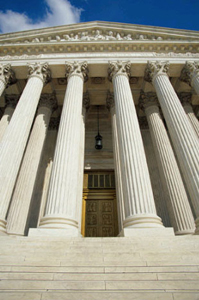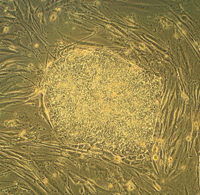 In an order issued earlier today, the Supreme Court denied certiorari in Sherley v. Sebelius, ending the efforts by two adult stem cell researchers to prevent the National Institutes of Health (NIH) from funding research using human embryonic stem cells (ESCs). The dispute arose following the NIH's release in July 2009 of new guidelines governing the requirements for federal funding of research on human ESCs (see "NIH Releases New Stem Cell Rules"). The NIH's guidelines replaced rules promulgated during the Bush Administration that limited the number of funding-eligible human stem cell lines to 69. Under the NIH's new guidelines, which were developed in response to an Executive Order issued by President Obama in March 2009 (see "President Obama to Lift Stem Cell Limits on Monday"), human ESCs that are listed on the NIH's stem cell registry (established pursuant to the guidelines) are eligible for funding. The guidelines permitted human ESCs that were created using in vitro fertilization for reproductive purposes, but which we no longer needed for this purpose, to be listed on the registry.
In an order issued earlier today, the Supreme Court denied certiorari in Sherley v. Sebelius, ending the efforts by two adult stem cell researchers to prevent the National Institutes of Health (NIH) from funding research using human embryonic stem cells (ESCs). The dispute arose following the NIH's release in July 2009 of new guidelines governing the requirements for federal funding of research on human ESCs (see "NIH Releases New Stem Cell Rules"). The NIH's guidelines replaced rules promulgated during the Bush Administration that limited the number of funding-eligible human stem cell lines to 69. Under the NIH's new guidelines, which were developed in response to an Executive Order issued by President Obama in March 2009 (see "President Obama to Lift Stem Cell Limits on Monday"), human ESCs that are listed on the NIH's stem cell registry (established pursuant to the guidelines) are eligible for funding. The guidelines permitted human ESCs that were created using in vitro fertilization for reproductive purposes, but which we no longer needed for this purpose, to be listed on the registry.
In response to the NIH's promulgation of the stem cell guidelines, Dr. James Sherley and Dr. Theresa Deisher, two researchers who only use adult stem cells in their research, filed suit, along with several other plaintiffs, to enjoin the NIH from funding research using human ESCs. In particular, the Appellees contended that by funding research projects using ESCs, the NIH violated the Dickey-Wicker Amendment, which Congress has included in the annual appropriation for the Department of Health and Human Services each year since 1996. The Dickey-Wicker Amendment prohibits the NIH from funding:
(1) the creation of a human embryo or embryos for research purposes; or (2) research in which a human embryo or embryos are destroyed, discarded, or knowingly subjected to risk of injury or death greater than that allowed for research on fetuses in utero under 45 C.F.R. 46.204(b) and section 498(b) of the Public Health Service Act (42 U.S.C. 289g(b)).
 The District Court for the District of Columbia granted the Government's motion to dismiss the suit for lack of standing, the plaintiffs appealed, and the U.S. Court of Appeals for the District of Columbia Circuit remanded, finding that Drs. Sherley and Deisher had standing because they competed with human ESC researchers for NIH funding. On remand, the District Court granted Appellees' motion for a preliminary injunction, concluding that they were likely to succeed in showing that the NIH's guidelines violated the Dickey-Wicker Amendment. On appeal, the U.S. Court of Appeals for the District of Columbia Circuit vacated the preliminary injunction, finding that the Appellees were unlikely to prevail because the Dickey-Wicker Amendment is ambiguous and the NIH reasonably concluded that, although the Dickey-Wicker Amendment bars funding for the destructive act of deriving a human ESC from an embryo, it does not prohibit funding a research project in which a human ESC will be used.
The District Court for the District of Columbia granted the Government's motion to dismiss the suit for lack of standing, the plaintiffs appealed, and the U.S. Court of Appeals for the District of Columbia Circuit remanded, finding that Drs. Sherley and Deisher had standing because they competed with human ESC researchers for NIH funding. On remand, the District Court granted Appellees' motion for a preliminary injunction, concluding that they were likely to succeed in showing that the NIH's guidelines violated the Dickey-Wicker Amendment. On appeal, the U.S. Court of Appeals for the District of Columbia Circuit vacated the preliminary injunction, finding that the Appellees were unlikely to prevail because the Dickey-Wicker Amendment is ambiguous and the NIH reasonably concluded that, although the Dickey-Wicker Amendment bars funding for the destructive act of deriving a human ESC from an embryo, it does not prohibit funding a research project in which a human ESC will be used.